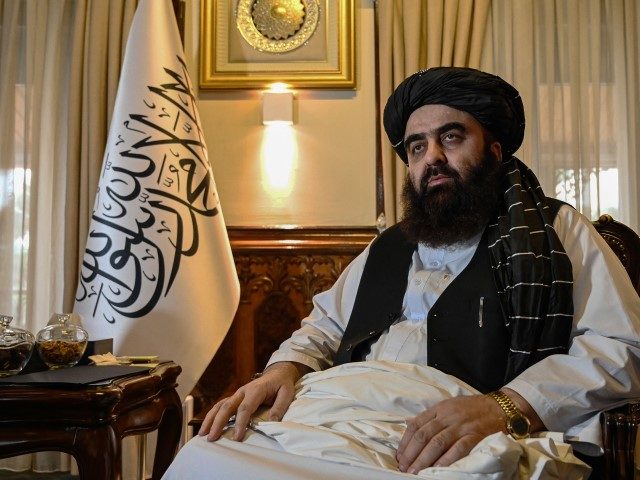The Taliban confirmed the arrival of its “Foreign Minister” Mawlawi Amir Khan Muttaqi in China on Wednesday to participate in a summit hosted by the Communist Party on the future of Afghanistan.
The Chinese government welcomed the top diplomats of countries neighboring Afghanistan – Pakistan, Iran, Russia, Tajikistan, Turkmenistan, Uzbekistan, Indonesia and Qatar – for a summit in Anhui province set to continue through Thursday to discuss how best to address the Taliban’s seizure of power in the country. China will host a separate summit in Anhui at the same time bringing Russia and the United States together to discuss Afghanistan.
Chinese state media outlets suggested that Russia’s ongoing invasion of Ukraine would emerge as part of the conversation between the three countries in addition to the main issue of Afghanistan under Taliban rule. The Chinese Foreign Ministry, however, emphasized discussion of Afghanistan.
“China, the U.S. and Russia are countries that have important influence on Afghan issues,” Foreign Ministry spokesman Wang Wenbin said on Tuesday. “We hope this meeting will actively echo the third Meeting of Foreign Ministers of Afghanistan’s Neighboring Countries on further unifying consensus, promoting regional countries and the international community’s support to Afghanistan’s peaceful rebuilding and helping the country realize peace, stability and development.”
China has placed discussing how to interact with and recognize the Taliban at the top of the agenda for its Afghanistan summit. At press time, no state actor has recognized the Taliban as the legitimate government of the country. Chinese officials will also reportedly introduce investing in “humanitarian” support for the people of Afghanistan, and in the Taliban itself, as a topic. Taliban leaders have expressed intense interest in joining China’s “Belt and Road” debt trap infrastructure plan and attracting Communist Party investment since the jihadist group seized power in the country in August.
The Taliban’s Bakhtar News Agency published photos on Wednesday of Chinese officials greeting top diplomat Muttaqi and his “high-level delegation” in Anhui and confirmed that the Communist Party extended the Taliban a formal invitation to the event.
Muttaqi’s first order of business, according to Taliban deputy spokesman Bilal Karimi, was to meet with the foreign ministers of Pakistan and China.
“At today’s trilateral meeting held in China, Chinese Foreign Minister Wang Yi said he is eager for the trilateral talks to be revived and [for the countries] to continue their comprehensive cooperation through this mechanism,” Karimi wrote on Twitter. “Mr. Wang called on the three countries to deepen political and economic cooperation.”
Muttaqi, the Taliban relayed, insisted that the jihadists were less interested in humanitarian aid donations than in financial investment in Afghanistan and “economic partnerships.”
“He added that the Afghan government wants to connect both Central Asia and South Asia through transit and that Afghan products reach China and India through Pakistan,” according to Karimi.
“Afghanistan supports China’s major Belt and Road Initiative and is keen to see Afghanistan play a useful role in regional integration through this project,” Muttaqi reportedly added.
The Belt and Road Initiative (BRI) is the Communist Party’s global plan to offer predatory loans to vulnerable state governments meant to be used to pay China to build expensive road, port, and railway projects. China advertises the BRI as a reconstruction of the Ancient Silk Road connecting Beijing to western Europe, but has invested heavily in convincing countries far outside of the path of that ancient trade route, particularly in Africa and Latin America, to join. Unlike some of the countries most negatively affected by the BRI – notably Kenya, Sri Lanka, and Argentina – Afghanistan was a critical connection between Asia and Europe in the ancient world, a point both the Taliban and the Communist Party regularly emphasize.
Taliban leaders have called for close cooperation with the Communist Party since they took over the country in August 2021, following President Joe Biden’s decision to extend the 20-year Afghan War beyond the May 1, 2021, deadline that President Donald Trump had agreed to in a deal with the former Afghan government and the Taliban. Taliban leaders launched a campaign to fully oust the U.S.-backed government following Biden’s decision to break the agreement, announcing that the violation freed them to resume their jihad. When Taliban fighters arrived in the capital, Kabul, in August, former President Ashraf Ghani abruptly fled, leaving a power vacuum the Taliban rapidly filled.
“China, our great neighboring country, can have a constructive and positive role in the reconstruction of Afghanistan and also in the economic development and prosperity of the people of Afghanistan,” Taliban spokesman Suhail Shaheen said following the terrorist group’s return to power. “It is expected [that] China [will] play its role.”
Another top spokesman, Zabihullah Mujahid, declared China a “neighbor” and told reporters that the Taliban had promised the Communist Party “security for their investments and assets.”
Taliban leaders have expressed no concerns that China is currently engaging in genocide against Muslim-majority ethnic groups in East Turkistan, an occupied region under Chinese rule that borders Afghanistan.
Follow Frances Martel on Facebook and Twitter.

COMMENTS
Please let us know if you're having issues with commenting.